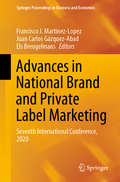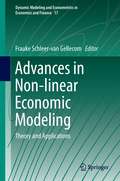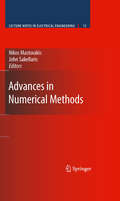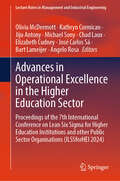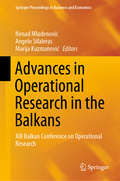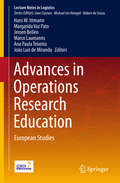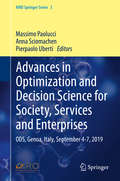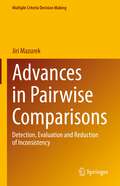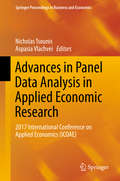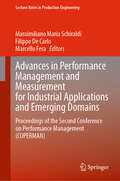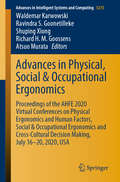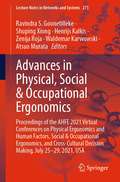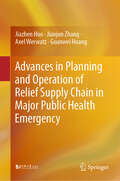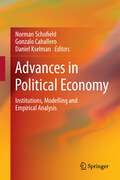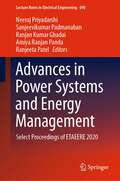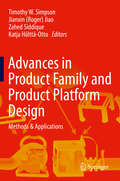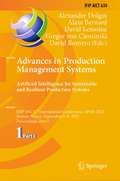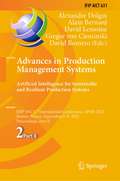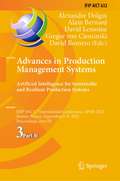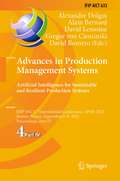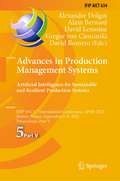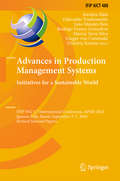- Table View
- List View
Advances in National Brand and Private Label Marketing: Seventh International Conference, 2020 (Springer Proceedings in Business and Economics)
by Juan Carlos Gázquez-Abad Francisco J. Martinez-Lopez Els BreugelmansThis proceedings volume highlights the latest research presented at the 7th International Conference on Research on National Brand & Private Label Marketing (NB&PL2020, Barcelona, Spain). The topics covered include: retailing, private label portfolio and assortment management, marketing of premium store brands, using national brands to exclude (delist) and include, optimal assortment size, consumer store patronage, etc. Several contributions also focus on private label pricing and promotion, especially on the relative pricing of standard and premium private labels, and with regard to the national brands in the assortment. Further questions addressed here include: Should store brands be promoted? If so, what types of promotion should be used? How can private label penetration, especially premium private labels, best be dealt with? Are dual branding and coupons viable options?
Advances in National Brand and Private Label Marketing: Sixth International Conference, 2019 (Springer Proceedings in Business and Economics)
by Francisco J. Martínez-López Juan Carlos Gázquez-Abad Anne RoggeveenThe 2019 International Conference on National Brand & Private Label Marketing is a unique academic forum for presenting and discussing original, rigorous and significant contributions from researchers around the world on marketing issues that retailers, store brand managers and national brand managers are facing.The three-day event covered a wide range of topics from varied fields including retailing, marketing, general business, psychology, economics and statistics. Further, it addressed diverse areas of application such as innovation, retail market structure, social media, consumer decision-making, store loyalty, assortment size, digital transformation, ethical aspects, cultural dimensions, and private label pricing. This volume gathers the proceedings of the 2019 NB&PL marketing conference in a collection of outstanding contributions that employ a wide variety of theoretical and methodological approaches.
Advances in National Brand and Private Label Marketing: Third International Conference, 2016 (Springer Proceedings in Business and Economics)
by Francisco J. Martínez-López Juan Carlos Gázquez-Abad Els GijsbrechtThis book presents the latest research on national brand and private label marketing, in the form of original, rigorous and relevant contributions from the 2016 National Brands and Private Label Marketing conference in Barcelona. It covers retailing-related topics, such as brand naming and packaging decisions, price elasticity, positioning, branding, consumer behavior, economic crisis, strategies in growth, and mature private labels.
Advances in Natural Hazards and Volcanic Risks: Proceedings of the 3rd International Workshop on Natural Hazards (NATHAZ’22), Terceira Island—Azores 2022 (Advances in Science, Technology & Innovation)
by Helder I. Chaminé Francisco Fernandes Ana MalheiroThis book comprises the selected proceedings of the 3rd International Workshop on Natural Hazards (NATHAZ’22), Angra do Heroísmo, Terceira Island, Azores, 2022. The book interests all researchers and practitioners in Earth Sciences, Volcanic Risks, Natural Hazards, Geoethics, Environmental Sciences and Engineering. Terceira is a volcanic island with volcanic systems with caldera (Cinco Picos, Guilherme Moniz, Santa Bárbara and Pico Alto central volcanoes) and an active fissural zone defined by various alignments of small volcanic cones, lava domes and fault zones. The agricultural landscape, the natural and forest reserve, as well as the natural pools make the island a unique place to visit. The historic downtown of Angra do Heroísmo is a UNESCO world heritage, and several iconic buildings witness the island’s geodynamic history. Natural hazards result from a threat of a naturally occurring event that will have a negative effect on humans. That damaging effect is often called natural disasters. Among the natural hazards and potential disasters to be considered are: earthquakes, volcanic eruptions, landslides, subsidence, floods, droughts and coastal erosion. In addition, anthropogenic hazards occur as a result of human interaction with the environment. They comprise technological risks due to exposure to hazardous substances in the environment. Natural systems in different frameworks require a comprehensive understanding of climatology, geology, hydrology and volcanic data, processes and dynamics. Thus, it is important to perform hazard and risk assessment studies to accomplish hazard mitigation. In addition, it highlighted the role of variability and climate change in Earth systems. Furthermore, an accurate understanding of the natural systems and interactions with engineering, geodiversity and natural resources is vital to the entire socioeconomic sector. This book is expected to offer an overview of natural hazards in model regions in Europe, America, Asia and the Atlantic islands. It gives new insights into the characterization, assessment, protection, and modelling of geological hazards, volcanic systems, urban areas, coastal zones and engineering approaches by international researchers and professionals. The scientific committee comprises lead geoscientists, natural hazards related practitioners, and academics worldwide. The main topics include: 1. Multi-hazards and risks: sustainable society, disasters and geoethics 2. Natural hazards and assessment: rock falls, landslides, urban planning and management 3. Sustainable Earth systems: hazards and climate change 4. Terceira Island geology and geodiversity: meeting volcanological hazards in the Azores
Advances in Non-linear Economic Modeling: Theory and Applications (Dynamic Modeling and Econometrics in Economics and Finance #17)
by Frauke Schleer-van GellecomIn recent years nonlinearities have gained increasing importance in economic and econometric research, particularly after the financial crisis and the economic downturn after 2007. This book contains theoretical, computational and empirical papers that incorporate nonlinearities in econometric models and apply them to real economic problems. It intends to serve as an inspiration for researchers to take potential nonlinearities in account. Researchers should be aware of applying linear model-types spuriously to problems which include non-linear features. It is indispensable to use the correct model type in order to avoid biased recommendations for economic policy.
Advances in Numerical Methods (Lecture Notes in Electrical Engineering #11)
by Nikos Mastorakis John SakellarisRecent Advances in Numerical Methods features contributions from distinguished researchers, focused on significant aspects of current numerical methods and computational mathematics. The increasing necessity to present new computational methods that can solve complex scientific and engineering problems requires the preparation of this volume with actual new results and innovative methods that provide numerical solutions in effective computing times. Each chapter will present new and advanced methods and modern variations on known techniques that can solve difficult scientific problems efficiently.
Advances in Operational Excellence in the Higher Education Sector: Proceedings of the 7th International Conference on Lean Six Sigma for Higher Education Institutions and other Public Sector Organisations (ILSSforHEI 2024) (Lecture Notes in Management and Industrial Engineering)
by Jiju Antony Chad Laux Elizabeth Cudney Olivia McDermott Angelo Rosa José Carlos Sá Kathryn Cormican Michael Sony Bart LameijerThis book reports on advances in applications of Lean Six Sigma and Operational Excellence in Higher Education Institutes and in other Public Sector organisations with a special emphasis on Kaizen, Lean, Business Excellence Models, and Digitisation. Further topics include Leadership for Higher Education Institutes and public sectors in Operational Excellence and building a culture for Operational Excellence. Chapters report on theoretical research and case studies concerning Operational Excellence, Lean Six Sigma and Quality Management applications. Based on the 7th International Conference on Operational Excellence in Higher Educational Institutes and other public sector organisations (2024), held on September 2nd-3rd, 2024, at the University of Galway in Ireland, this book offers a timely reference for both academics and professionals in the broad field of Operational Excellence.
Advances in Operational Research in the Balkans: XIII Balkan Conference on Operational Research (Springer Proceedings in Business and Economics)
by Angelo Sifaleras Nenad Mladenović Marija KuzmanovićThis proceedings volume presents recent theoretical and practical advances in operational research (OR). The papers focus on a number of key areas including combinatorial optimization, integer programming, heuristics, and mathematical programming. In addition, this volume highlights OR applications in different areas such as financial decision making, marketing, e-business, project management, scheduling, traffic and transportation. The chapters are based on papers presented at the 13th Balkan Conference on Operations Research (BALCOR). BALCOR is an established biennial conference. The selected papers promote international collaboration among researchers and practitioners, with a particular focus on the Balkan countries.
Advances in Operations Research Education: European Studies (Lecture Notes in Logistics)
by João Luís de Miranda Jeroen Beliën Ana Paula Teixeira Hans W. Ittmann Marco Laumanns Margarida Vaz PatoThis edited monograph contains a comprehensive overview of educational developments in the fields of operations research (OR) and management science (MS). The book outlines key factors in OR/MS curricular programs and analyses different approaches regarding student enrollment and failure rates. The approach is genuinely international, whereas the focus lies on the European level. The target audience primarily comprises public policy planners in education, deans and school directors as well as program coordinators.
Advances in Optimization and Decision Science for Society, Services and Enterprises: ODS, Genoa, Italy, September 4-7, 2019 (AIRO Springer Series #3)
by Massimo Paolucci Anna Sciomachen Pierpaolo UbertiThe contributions included in the volume are drawn from presentations at ODS2019 – International Conference on Optimization and Decision Science, which was the 49th annual meeting of the Italian Operations Research Society (AIRO) held at Genoa, Italy, on 4-7 September 2019. This book presents very recent results in the field of Optimization and Decision Science. While the book is addressed primarily to the Operations Research (OR) community, the interdisciplinary contents ensure that it will also be of very high interest for scholars and researchers from many scientific disciplines, including computer sciences, economics, mathematics, and engineering. Operations Research is known as the discipline of optimization applied to real-world problems and to complex decision-making fields. The focus is on mathematical and quantitative methods aimed at determining optimal or near-optimal solutions in acceptable computation times. This volume not only presents theoretical results but also covers real industrial applications, making it interesting for practitioners facing decision problems in logistics, manufacturing production, and services. Readers will accordingly find innovative ideas from both a methodological and an applied perspective.
Advances in Pairwise Comparisons: Detection, Evaluation and Reduction of Inconsistency (Multiple Criteria Decision Making)
by Jiri MazurekThis book tackles issues associated with inconsistency in pairwise comparisons from both theoretical and practical perspectives. Human judgments are seldom absolutely consistent, or absolutely precise, therefore problems of measuring and handling inconsistency belong among hot topics of the current research, especially in the theoretical framework of multiple criteria decision aiding (MCDA). The book presents and discusses the state-of-the-art of this field including both cardinal and ordinal inconsistency, the problems of different scales for comparisons and inconsistency reduction, and the alternative approaches to inconsistency detection and measurement. This book is a unique one-stop guide for readers who are interested in inconsistency in pairwise comparisons. Researchers and practitioners in the area of multiple-criteria decision-making (MCDM) and the analytic hierarchy process (AHP) will find this informative book particularly valuable.
Advances in Panel Data Analysis in Applied Economic Research: 2017 International Conference On Applied Economics (icoae) (Springer Proceedings In Business And Economics)
by Nicholas Tsounis Aspasia VlachveiThis proceedings volume presents new methods and applications in applied economic research with an emphasis on advances in panel data analysis. Featuring papers presented at the 2017 International Conference on Applied Economics (ICOAE) held at Coventry University, this volume provides current research on econometric panel data methodologies as they are applied in microeconomics, macroeconomics, financial economics and agricultural economics. <P><P> International Conference on Applied Economics (ICOAE) is an annual conference that started in 2008 designed to bring together economists from different fields of applied economic research in order to share methods and ideas. Applied economics is a rapidly growing field of economics that combines economic theory with econometrics to analyse economic problems of the real world usually with economic policy interest. In addition, there is growing interest in the field for panel data estimation methods, tests and techniques. This volume makes a contribution in the field of applied economic research in this area. Featuring country specific studies, this book will be of interest to academics, students, researchers, practitioners, and policy makers in applied economics and economic policy.
Advances in Performance Management and Measurement for Industrial Applications and Emerging Domains: Proceedings of the Second Conference on Performance Management (COPERMAN) (Lecture Notes in Production Engineering)
by Marcello Fera Massimiliano Maria Schiraldi Filippo De CarloThis book is a compilation of the papers presented at the COPERMAN 2023 conference, a meeting that bridges the gap between academia and industry in the field of performance management. This international conference brought together scientists and engineers from around the world to discuss and address many themes related to performance management, including the development of new methods and systems for performance measurement and management, the evaluation of human performance in various industrial contexts (including modern Industry 4.0 factory environments), and methodologies for business deployment. The book is for academics, graduate students, researchers, and industrial practitioners working in performance management. Its comprehensive coverage of diverse topics and cutting-edge research will provide readers with insights and knowledge that can be applied in their daily work, as well as inspire new research directions and interdisciplinary collaboration.
Advances in Physical, Social & Occupational Ergonomics: Proceedings of the AHFE 2020 Virtual Conferences on Physical Ergonomics and Human Factors, Social & Occupational Ergonomics and Cross-Cultural Decision Making, July 16–20, 2020, USA (Advances in Intelligent Systems and Computing #1215)
by Waldemar Karwowski Richard H. M. Goossens Ravindra S. Goonetilleke Atsuo Murata Shuping XiongThis book reports on cutting-edge findings and developments in physical, social and occupational ergonomics. It covers a broad spectrum of studies and evaluation procedures concerning physical and mental workload, work posture and ergonomic risk. Further, it reports on significant advances in the design of services and systems, including those addressing special populations, for purposes such as health, safety and education, and discusses solutions for a better and safer integration of humans, automated systems and digital technologies. The book also analyzes the impact of culture on people’s cognition and behavior, providing readers with timely insights into theories on cross-cultural decision-making, and their diverse applications for a number of purposes in businesses and societies. Based on three AHFE 2020 conferences (the AHFE 2020 Virtual Conference on Physical Ergonomics and Human Factors, the AHFE 2020 Virtual Conference on Social & Occupational Ergonomics, and the AHFE 2020 Virtual Conference on Cross-Cultural Decision Making), it provides readers with a comprehensive overview of the current challenges in physical, social and occupational ergonomics, including those imposed by technological developments, highlights key connections between them, and puts forward optimization strategies for sociotechnical systems, including their organizational structures, policies and processes.
Advances in Physical, Social & Occupational Ergonomics: Proceedings of the AHFE 2021 Virtual Conferences on Physical Ergonomics and Human Factors, Social & Occupational Ergonomics, and Cross-Cultural Decision Making, July 25-29, 2021, USA (Lecture Notes in Networks and Systems #273)
by Waldemar Karwowski Ravindra S. Goonetilleke Atsuo Murata Shuping Xiong Henrijs Kalkis Zenija RojaThis book reports on cutting-edge findings and developments in physical, social and occupational ergonomics. It covers a broad spectrum of studies and evaluation procedures concerning physical and mental workload, work posture and ergonomic risk. Further, it reports on significant advances in the design of services and systems, including those addressing special populations, for purposes such as health, safety and education, and discusses solutions for a better and safer integration of humans, automated systems and digital technologies. The book also analyzes the impact of culture on people’s cognition and behavior, providing readers with timely insights into theories on cross-cultural decision-making, and their diverse applications for a number of purposes in businesses and societies. Based on the AHFE 2021 conferences on Physical Ergonomics and Human Factors, Social & Occupational Ergonomics, and Cross-Cultural Decision Making, held virtually on 25–29 July, 2021, from USA, it provides readers with a comprehensive overview of the current challenges in physical, social and occupational ergonomics, including those imposed by technological developments, highlights key connections between them, and puts forward optimization strategies for sociotechnical systems, including their organizational structures, policies and processes.
Advances in Planning and Operation of Relief Supply Chain in Major Public Health Emergency
by Jianjun Zhang Jiazhen Huo Axel Werwatz Guanwei HuangWith Operations Research and System Dynamics as research tools, this book discusses the theme of emergency supplies in Major Public Health Emergency (MPHE) scenarios. The subject includes a series of new issues: critical criteria matching supply with demand for emergency supplies in MPHE, emergency medical materials reserve mode, dynamic optimization of emergency logistics, dynamic optimization of allocating multi-period and multi-category emergency supplies, etc. This book is suitable for university teachers, undergraduate and graduate students, and researchers in fields of logistics and supply chain management as well as emergency management. The most important features of this book include: Firstly, to achieve fairness and accuracy of material distribution during the epidemic, this book constructs a material shortage adjustment function. Secondly, from the comprehensive perspective of cross-regional coordination, multi-organization coordination and multiperiod coordination, the operation optimization models of emergency material supply in major epidemic situation are constructed. Additionally, the comparative analysis and empirical research of the practices in China and Germany also reflects the novelty and benefit of the book.
Advances in Political Economy: Institutions, Modelling and Empirical Analysis
by Norman Schofield Daniel Kselman Gonzalo CaballeroThis book presents latest research in the field of Political Economy, dealing with the integration of economics and politics and the way institutions affect social decisions. The focus is on innovative topics such as an institutional analysis based on case studies; the influence of activists on political decisions; new techniques for analyzing elections, involving game theory and empirical methods.
Advances in Power Systems and Energy Management: Select Proceedings of ETAEERE 2020 (Lecture Notes in Electrical Engineering #690)
by Amiya Ranjan Panda Sanjeevikumar Padmanaban Neeraj Priyadarshi Ranjan Kumar Ghadai Ranjeeta PatelThis book comprises select proceedings of the international conference ETAEERE 2020, and focuses on contemporary issues in energy management and energy efficiency in the context of power systems. The contents cover modeling, simulation and optimization based studies on topics like medium voltage BTB system, cost optimization of a ring frame unit in textile industry, rectenna for RF energy harvesting, ecology and energy dimension in infrastructural designs, study of AGC in two area hydro thermal power system, energy-efficient and reliable depth-based routing protocol for underwater wireless sensor network, and power line communication. This book can be beneficial for students, researchers as well as industry professionals.
Advances in Product Family and Product Platform Design: Methods & Applications
by Timothy W. Simpson Jianxin Roger Jiao Zahed Siddique Katja Hölttä-OttoAdvances in Product Family and Product Platform Design: Methods & Applications highlights recent advances that have been made to support product family and product platform design along with successful applications in industry. This book provides not only motivation for product family and product platform design (i. e. , address questions about "why and when should we platform") but also methods and tools to support the design and development of families of products based on shared platforms (i. e. address the "how" and "what" questions about platforming). It begins with a general overview of product family design to introduce the general reader to the topic and then progress to more advanced topics and design theory to help designers, engineers, and project managers plan, architect, and implement platform-based product development strategies for their company. Finally, successful industry applications provide readers and practitioners with case studies and "talking points" to become platform advocates and leaders within their organization.
Advances in Production Management Systems. Artificial Intelligence for Sustainable and Resilient Production Systems: IFIP WG 5.7 International Conference, APMS 2021, Nantes, France, September 5–9, 2021, Proceedings, Part I (IFIP Advances in Information and Communication Technology #630)
by Alain Bernard Gregor Von Cieminski David Romero Alexandre Dolgui David LemoineThe five-volume set IFIP AICT 630, 631, 632, 633, and 634 constitutes the refereed proceedings of the International IFIP WG 5.7 Conference on Advances in Production Management Systems, APMS 2021, held in Nantes, France, in September 2021.*The 378 papers presented were carefully reviewed and selected from 529 submissions. They discuss artificial intelligence techniques, decision aid and new and renewed paradigms for sustainable and resilient production systems at four-wall factory and value chain levels. The papers are organized in the following topical sections: Part I: artificial intelligence based optimization techniques for demand-driven manufacturing; hybrid approaches for production planning and scheduling; intelligent systems for manufacturing planning and control in the industry 4.0; learning and robust decision support systems for agile manufacturing environments; low-code and model-driven engineering for production system; meta-heuristics and optimization techniques for energy-oriented manufacturing systems; metaheuristics for production systems; modern analytics and new AI-based smart techniques for replenishment and production planning under uncertainty; system identification for manufacturing control applications; and the future of lean thinking and practice Part II: digital transformation of SME manufacturers: the crucial role of standard; digital transformations towards supply chain resiliency; engineering of smart-product-service-systems of the future; lean and Six Sigma in services healthcare; new trends and challenges in reconfigurable, flexible or agile production system; production management in food supply chains; and sustainability in production planning and lot-sizing Part III: autonomous robots in delivery logistics; digital transformation approaches in production management; finance-driven supply chain; gastronomic service system design; modern scheduling and applications in industry 4.0; recent advances in sustainable manufacturing; regular session: green production and circularity concepts; regular session: improvement models and methods for green and innovative systems; regular session: supply chain and routing management; regular session: robotics and human aspects; regular session: classification and data management methods; smart supply chain and production in society 5.0 era; and supply chain risk management under coronavirus Part IV: AI for resilience in global supply chain networks in the context of pandemic disruptions; blockchain in the operations and supply chain management; data-based services as key enablers for smart products, manufacturing and assembly; data-driven methods for supply chain optimization; digital twins based on systems engineering and semantic modeling; digital twins in companies first developments and future challenges; human-centered artificial intelligence in smart manufacturing for the operator 4.0; operations management in engineer-to-order manufacturing; product and asset life cycle management for smart and sustainable manufacturing systems; robotics technologies for control, smart manufacturing and logistics; serious games analytics: improving games and learning support; smart and sustainable production and supply chains; smart methods and techniques for sustainable supply chain management; the new digital lean manufacturing paradigm; and the role of emerging technologies in disaster relief operations: lessons from COVID-19 Part V: data-driven platforms and applications in production and logistics: digital twins and AI for sustainability; regular session: new approaches for routing problem solving; regular session: improvement of design and operation of manufacturing systems; regular session: crossdock and transportation issues; regular session: maintenance improvement and lifecycle management; regular session: additive manufacturing and mass customization; regular session: frameworks and conceptual modelling for systems and services efficiency; regular session: optimization of production and transportation
Advances in Production Management Systems. Artificial Intelligence for Sustainable and Resilient Production Systems: IFIP WG 5.7 International Conference, APMS 2021, Nantes, France, September 5–9, 2021, Proceedings, Part II (IFIP Advances in Information and Communication Technology #631)
by Alain Bernard Gregor Von Cieminski David Romero Alexandre Dolgui David LemoineThe five-volume set IFIP AICT 630, 631, 632, 633, and 634 constitutes the refereed proceedings of the International IFIP WG 5.7 Conference on Advances in Production Management Systems, APMS 2021, held in Nantes, France, in September 2021.*The 378 papers presented were carefully reviewed and selected from 529 submissions. They discuss artificial intelligence techniques, decision aid and new and renewed paradigms for sustainable and resilient production systems at four-wall factory and value chain levels. The papers are organized in the following topical sections: Part I: artificial intelligence based optimization techniques for demand-driven manufacturing; hybrid approaches for production planning and scheduling; intelligent systems for manufacturing planning and control in the industry 4.0; learning and robust decision support systems for agile manufacturing environments; low-code and model-driven engineering for production system; meta-heuristics and optimization techniques for energy-oriented manufacturing systems; metaheuristics for production systems; modern analytics and new AI-based smart techniques for replenishment and production planning under uncertainty; system identification for manufacturing control applications; and the future of lean thinking and practice Part II: digital transformation of SME manufacturers: the crucial role of standard; digital transformations towards supply chain resiliency; engineering of smart-product-service-systems of the future; lean and Six Sigma in services healthcare; new trends and challenges in reconfigurable, flexible or agile production system; production management in food supply chains; and sustainability in production planning and lot-sizing Part III: autonomous robots in delivery logistics; digital transformation approaches in production management; finance-driven supply chain; gastronomic service system design; modern scheduling and applications in industry 4.0; recent advances in sustainable manufacturing; regular session: green production and circularity concepts; regular session: improvement models and methods for green and innovative systems; regular session: supply chain and routing management; regular session: robotics and human aspects; regular session: classification and data management methods; smart supply chain and production in society 5.0 era; and supply chain risk management under coronavirus Part IV: AI for resilience in global supply chain networks in the context of pandemic disruptions; blockchain in the operations and supply chain management; data-based services as key enablers for smart products, manufacturing and assembly; data-driven methods for supply chain optimization; digital twins based on systems engineering and semantic modeling; digital twins in companies first developments and future challenges; human-centered artificial intelligence in smart manufacturing for the operator 4.0; operations management in engineer-to-order manufacturing; product and asset life cycle management for smart and sustainable manufacturing systems; robotics technologies for control, smart manufacturing and logistics; serious games analytics: improving games and learning support; smart and sustainable production and supply chains; smart methods and techniques for sustainable supply chain management; the new digital lean manufacturing paradigm; and the role of emerging technologies in disaster relief operations: lessons from COVID-19 Part V: data-driven platforms and applications in production and logistics: digital twins and AI for sustainability; regular session: new approaches for routing problem solving; regular session: improvement of design and operation of manufacturing systems; regular session: crossdock and transportation issues; regular session: maintenance improvement and lifecycle management; regular session: additive manufacturing and mass customization; regular session: frameworks and conceptual modelling for systems and services efficiency; regular session: optimization of production and transportation
Advances in Production Management Systems. Artificial Intelligence for Sustainable and Resilient Production Systems: IFIP WG 5.7 International Conference, APMS 2021, Nantes, France, September 5–9, 2021, Proceedings, Part III (IFIP Advances in Information and Communication Technology #632)
by Alain Bernard Gregor Von Cieminski David Romero Alexandre Dolgui David LemoineThe five-volume set IFIP AICT 630, 631, 632, 633, and 634 constitutes the refereed proceedings of the International IFIP WG 5.7 Conference on Advances in Production Management Systems, APMS 2021, held in Nantes, France, in September 2021.*The 378 papers presented were carefully reviewed and selected from 529 submissions. They discuss artificial intelligence techniques, decision aid and new and renewed paradigms for sustainable and resilient production systems at four-wall factory and value chain levels. The papers are organized in the following topical sections: Part I: artificial intelligence based optimization techniques for demand-driven manufacturing; hybrid approaches for production planning and scheduling; intelligent systems for manufacturing planning and control in the industry 4.0; learning and robust decision support systems for agile manufacturing environments; low-code and model-driven engineering for production system; meta-heuristics and optimization techniques for energy-oriented manufacturing systems; metaheuristics for production systems; modern analytics and new AI-based smart techniques for replenishment and production planning under uncertainty; system identification for manufacturing control applications; and the future of lean thinking and practice Part II: digital transformation of SME manufacturers: the crucial role of standard; digital transformations towards supply chain resiliency; engineering of smart-product-service-systems of the future; lean and Six Sigma in services healthcare; new trends and challenges in reconfigurable, flexible or agile production system; production management in food supply chains; and sustainability in production planning and lot-sizing Part III: autonomous robots in delivery logistics; digital transformation approaches in production management; finance-driven supply chain; gastronomic service system design; modern scheduling and applications in industry 4.0; recent advances in sustainable manufacturing; regular session: green production and circularity concepts; regular session: improvement models and methods for green and innovative systems; regular session: supply chain and routing management; regular session: robotics and human aspects; regular session: classification and data management methods; smart supply chain and production in society 5.0 era; and supply chain risk management under coronavirus Part IV: AI for resilience in global supply chain networks in the context of pandemic disruptions; blockchain in the operations and supply chain management; data-based services as key enablers for smart products, manufacturing and assembly; data-driven methods for supply chain optimization; digital twins based on systems engineering and semantic modeling; digital twins in companies first developments and future challenges; human-centered artificial intelligence in smart manufacturing for the operator 4.0; operations management in engineer-to-order manufacturing; product and asset life cycle management for smart and sustainable manufacturing systems; robotics technologies for control, smart manufacturing and logistics; serious games analytics: improving games and learning support; smart and sustainable production and supply chains; smart methods and techniques for sustainable supply chain management; the new digital lean manufacturing paradigm; and the role of emerging technologies in disaster relief operations: lessons from COVID-19 Part V: data-driven platforms and applications in production and logistics: digital twins and AI for sustainability; regular session: new approaches for routing problem solving; regular session: improvement of design and operation of manufacturing systems; regular session: crossdock and transportation issues; regular session: maintenance improvement and lifecycle management; regular session: additive manufacturing and mass customization; regular session: frameworks and conceptual modelling for systems and services efficiency; regular session: optimization of production and transportation
Advances in Production Management Systems. Artificial Intelligence for Sustainable and Resilient Production Systems: IFIP WG 5.7 International Conference, APMS 2021, Nantes, France, September 5–9, 2021, Proceedings, Part IV (IFIP Advances in Information and Communication Technology #633)
by Alain Bernard Gregor Von Cieminski David Romero Alexandre Dolgui David LemoineThe five-volume set IFIP AICT 630, 631, 632, 633, and 634 constitutes the refereed proceedings of the International IFIP WG 5.7 Conference on Advances in Production Management Systems, APMS 2021, held in Nantes, France, in September 2021.*The 378 papers presented were carefully reviewed and selected from 529 submissions. They discuss artificial intelligence techniques, decision aid and new and renewed paradigms for sustainable and resilient production systems at four-wall factory and value chain levels. The papers are organized in the following topical sections: Part I: artificial intelligence based optimization techniques for demand-driven manufacturing; hybrid approaches for production planning and scheduling; intelligent systems for manufacturing planning and control in the industry 4.0; learning and robust decision support systems for agile manufacturing environments; low-code and model-driven engineering for production system; meta-heuristics and optimization techniques for energy-oriented manufacturing systems; metaheuristics for production systems; modern analytics and new AI-based smart techniques for replenishment and production planning under uncertainty; system identification for manufacturing control applications; and the future of lean thinking and practice Part II: digital transformation of SME manufacturers: the crucial role of standard; digital transformations towards supply chain resiliency; engineering of smart-product-service-systems of the future; lean and Six Sigma in services healthcare; new trends and challenges in reconfigurable, flexible or agile production system; production management in food supply chains; and sustainability in production planning and lot-sizing Part III: autonomous robots in delivery logistics; digital transformation approaches in production management; finance-driven supply chain; gastronomic service system design; modern scheduling and applications in industry 4.0; recent advances in sustainable manufacturing; regular session: green production and circularity concepts; regular session: improvement models and methods for green and innovative systems; regular session: supply chain and routing management; regular session: robotics and human aspects; regular session: classification and data management methods; smart supply chain and production in society 5.0 era; and supply chain risk management under coronavirus Part IV: AI for resilience in global supply chain networks in the context of pandemic disruptions; blockchain in the operations and supply chain management; data-based services as key enablers for smart products, manufacturing and assembly; data-driven methods for supply chain optimization; digital twins based on systems engineering and semantic modeling; digital twins in companies first developments and future challenges; human-centered artificial intelligence in smart manufacturing for the operator 4.0; operations management in engineer-to-order manufacturing; product and asset life cycle management for smart and sustainable manufacturing systems; robotics technologies for control, smart manufacturing and logistics; serious games analytics: improving games and learning support; smart and sustainable production and supply chains; smart methods and techniques for sustainable supply chain management; the new digital lean manufacturing paradigm; and the role of emerging technologies in disaster relief operations: lessons from COVID-19 Part V: data-driven platforms and applications in production and logistics: digital twins and AI for sustainability; regular session: new approaches for routing problem solving; regular session: improvement of design and operation of manufacturing systems; regular session: crossdock and transportation issues; regular session: maintenance improvement and lifecycle management; regular session: additive manufacturing and mass customization; regular session: frameworks and conceptual modelling for systems and services efficiency; regular session: optimization of production and transportation
Advances in Production Management Systems. Artificial Intelligence for Sustainable and Resilient Production Systems: IFIP WG 5.7 International Conference, APMS 2021, Nantes, France, September 5–9, 2021, Proceedings, Part V (IFIP Advances in Information and Communication Technology #634)
by Alain Bernard Gregor Von Cieminski David Romero Alexandre Dolgui David LemoineThe five-volume set IFIP AICT 630, 631, 632, 633, and 634 constitutes the refereed proceedings of the International IFIP WG 5.7 Conference on Advances in Production Management Systems, APMS 2021, held in Nantes, France, in September 2021.*The 378 papers presented were carefully reviewed and selected from 529 submissions. They discuss artificial intelligence techniques, decision aid and new and renewed paradigms for sustainable and resilient production systems at four-wall factory and value chain levels. The papers are organized in the following topical sections: Part I: artificial intelligence based optimization techniques for demand-driven manufacturing; hybrid approaches for production planning and scheduling; intelligent systems for manufacturing planning and control in the industry 4.0; learning and robust decision support systems for agile manufacturing environments; low-code and model-driven engineering for production system; meta-heuristics and optimization techniques for energy-oriented manufacturing systems; metaheuristics for production systems; modern analytics and new AI-based smart techniques for replenishment and production planning under uncertainty; system identification for manufacturing control applications; and the future of lean thinking and practice Part II: digital transformation of SME manufacturers: the crucial role of standard; digital transformations towards supply chain resiliency; engineering of smart-product-service-systems of the future; lean and Six Sigma in services healthcare; new trends and challenges in reconfigurable, flexible or agile production system; production management in food supply chains; and sustainability in production planning and lot-sizing Part III: autonomous robots in delivery logistics; digital transformation approaches in production management; finance-driven supply chain; gastronomic service system design; modern scheduling and applications in industry 4.0; recent advances in sustainable manufacturing; regular session: green production and circularity concepts; regular session: improvement models and methods for green and innovative systems; regular session: supply chain and routing management; regular session: robotics and human aspects; regular session: classification and data management methods; smart supply chain and production in society 5.0 era; and supply chain risk management under coronavirus Part IV: AI for resilience in global supply chain networks in the context of pandemic disruptions; blockchain in the operations and supply chain management; data-based services as key enablers for smart products, manufacturing and assembly; data-driven methods for supply chain optimization; digital twins based on systems engineering and semantic modeling; digital twins in companies first developments and future challenges; human-centered artificial intelligence in smart manufacturing for the operator 4.0; operations management in engineer-to-order manufacturing; product and asset life cycle management for smart and sustainable manufacturing systems; robotics technologies for control, smart manufacturing and logistics; serious games analytics: improving games and learning support; smart and sustainable production and supply chains; smart methods and techniques for sustainable supply chain management; the new digital lean manufacturing paradigm; and the role of emerging technologies in disaster relief operations: lessons from COVID-19 Part V: data-driven platforms and applications in production and logistics: digital twins and AI for sustainability; regular session: new approaches for routing problem solving; regular session: improvement of design and operation of manufacturing systems; regular session: crossdock and transportation issues; regular session: maintenance improvement and lifecycle management; regular session: additive manufacturing and mass customization; regular session: frameworks and conceptual modelling for systems and services efficiency; regular session: optimization of production and transportation
Advances in Production Management Systems. Initiatives for a Sustainable World: IFIP WG 5.7 International Conference, APMS 2016, Iguassu Falls, Brazil, September 3-7, 2016, Revised Selected Papers (IFIP Advances in Information and Communication Technology #488)
by Dimitris Kiritsis Gregor Von Cieminski Irenilza Nääs Oduvaldo Vendrametto João Mendes Reis Rodrigo Franco Gonçalves Márcia Terra SilvaThis book constitutes the refereed post-conference proceedings of the International IFIP WG 5. 7 Conference on Advances in Production Management Systems, APMS 2016, held in Iguassu Falls, Brazil, in September 2016. The 117 revised full papers were carefully reviewed and selected from 164 submissions. They are organized in the following topical sections: computational intelligence in production management; intelligent manufacturing systems; knowledge-based PLM; modelling of business and operational processes; virtual, digital and smart factory; flexible, sustainable supply chains; large-scale supply chains; sustainable manufacturing; quality in production management; collaborative systems; innovation and collaborative networks; agrifood supply chains; production economics; lean manufacturing; cyber-physical technology deployments in smart manufacturing systems; smart manufacturing system characterization; knowledge management in production systems; service-oriented architecture for smart manufacturing systems; advances in cleaner production; sustainable production management; and operations management in engineer-to-order manufacturing.
